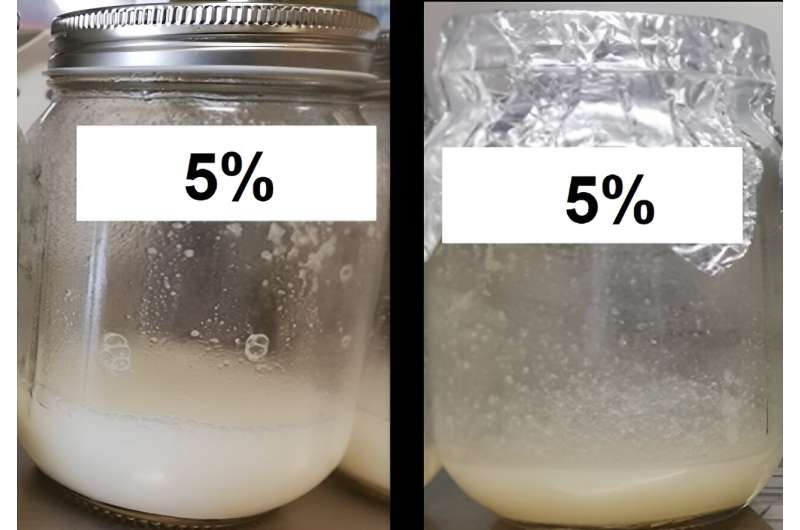This article has been reviewed according to Science X's editorial process and policies. Editors have highlighted the following attributes while ensuring the content's credibility:
fact-checked
peer-reviewed publication
trusted source
proofread
How heat treatment affects a milk alternative made from rice and coconut water

Whether they're made from soybeans, almonds, oats, or just sourced straight from the cow, milk products must go through heat treatment to prevent harmful bacterial growth and keep them safe. But understanding how these processes affect new, plant-based milk formulations could make the beverages more pleasant to drink as well. Researchers reporting in ACS Omega have discovered how pasteurization and sterilization affects the look and feel of one such drink made from coconut and rice.
Despite the ubiquity of dairy-based foods, many people have some form of lactose intolerance—up to 36% of Americans, according to the National Institutes of Health. As a result, many turn to lactose-free, plant-based alternatives, some of which have added health benefits.
For example, one drink under development combines rice flour and coconut water: Rice is hypoallergenic and high in fiber, and coconut water is hydrating and low in calories. To understand how heat treatment might alter this beverage, Jorge Yáñez-Fernández, Diana Castro-Rodríguez and colleagues wanted to test the formulation against two different high-temperature processing steps.
The team used three versions of the beverage, containing either 2%, 5% or 8% rice flour, with coconut water comprising the rest. These were heated either by pasteurization in a water bath at 140 degrees Fahrenheit or by sterilization in an autoclave at almost 250 degrees Fahrenheit.
After these treatments, the team found that the starches in the rice flour gelatinized and underwent the Maillard reaction, producing a slightly darkened color and stickier fluid for all three versions. Additionally, the drinks' acidities increased, and there were fewer sugars, which may alter the way they taste. The team plans to use these results to inform future research into similar, dairy-free, "functional beverages," including those that could one day contain probiotic, lactic-acid bacteria.
More information: Naella Sandivel Valencia Pérez et al, Role of Thermal Process on the Physicochemical and Rheological Properties and Antioxidant Capacity of a New Functional Beverage Based on Coconut Water and Rice Flour, ACS Omega (2023). DOI: 10.1021/acsomega.3c01761
Journal information: ACS Omega
Provided by American Chemical Society





















